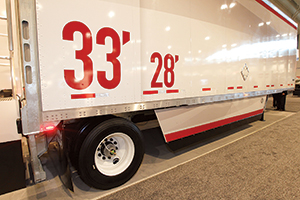Senior Reporter
Senate Deals Setback to Twin 33s

The U.S. Senate easily agreed to delay approval of twin 33-foot trailers nationwide, a key provision in a fiscal 2016 transportation funding bill.
By a voice vote Nov. 18, the chamber adopted an amendment to the funding bill — offered by Roger Wicker (R-Miss.) — that would allow the secretary of transportation to sign off on increases to the length of tractor-trailers only after determining through a study the new length would not negatively impact public safety.
A study would need to assess the benefits to public safety of extending the length of trailers allowed on federal highways from twin 28-foot trailers currently used to twin 33-foot trailers.
In a statement shortly after the vote, Wicker said: “The Senate stands with this overwhelming majority and with the 38 states who have said ‘no’ to these longer double trailers. This is a victory for public safety, states’ rights, and hard-working taxpayers.”
But American Trucking Associations President Bill Graves countered: “It is unfortunate the Senate has chosen to give up on what could be a very beneficial change in policy.”
The vote on Wicker’s amendment occurred soon after senators kicked off its consideration of the legislation that would keep transportation agencies, including trucking regulators, funded through the fiscal year. On Nov. 10, the Senate voted 56-31 to call on the negotiators of a highway reauthorization bill — different from the fiscal 2016 transportation funding bill — to delay approval of twin 33-foot trailers nationwide. That non-binding motion also was sponsored by Wicker.
In June, a Senate panel voted to include the provision allowing the use of twin 33-foot trailers nationwide in the transportation funding bill. The House-passed version includes a similar provision.
The House bill also adds requirements to a study of the Federal Motor Carrier Safety Administration’s hours-of-service rules for truck drivers.
ATA and other industry groups strongly support approving the use of twin 33s.
“This modest increase in tandem trailer length would reduce the number of truck trips needed to move an increasing amount of freight while making better use of a dwindling pool of drivers,” Graves said. “This common-sense solution holds the potential to ease congestion, reduce emissions and improve the efficiency of the supply chain. There are so many upsides to the use of twin 33s that it is inevitable this change will come to pass.”
Ed Patru, spokesman for the Coalition for Efficient and Responsible Trucking, noted this week that twin 33s are earning support because “they will not only make freight trucking more efficient but also reduce trucking congestion, cut down on accidents and generally make highways safer for truckers and motorists.”
The GOP-led Senate has yet to say if it would call up other funding bills before a stop-gap government funding measure expires Dec. 11. It is likely that both chambers will consider an expansive funding bill, known as an omnibus, before the short-term funding extension expires.
The House-passed highway policy bill would approve $261 billion for road programs, $55 billion for transit systems and about $9 billion for highway safety programs for six years.

